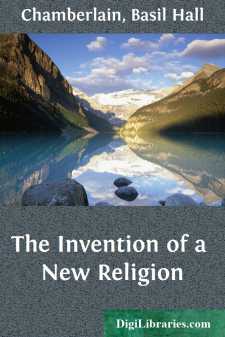Categories
- Antiques & Collectibles 13
- Architecture 36
- Art 48
- Bibles 22
- Biography & Autobiography 813
- Body, Mind & Spirit 142
- Business & Economics 28
- Children's Books 15
- Children's Fiction 12
- Computers 4
- Cooking 94
- Crafts & Hobbies 4
- Drama 346
- Education 46
- Family & Relationships 57
- Fiction 11828
- Games 19
- Gardening 17
- Health & Fitness 34
- History 1377
- House & Home 1
- Humor 147
- Juvenile Fiction 1873
- Juvenile Nonfiction 202
- Language Arts & Disciplines 88
- Law 16
- Literary Collections 686
- Literary Criticism 179
- Mathematics 13
- Medical 41
- Music 40
- Nature 179
- Non-Classifiable 1768
- Performing Arts 7
- Periodicals 1453
- Philosophy 64
- Photography 2
- Poetry 896
- Political Science 203
- Psychology 42
- Reference 154
- Religion 513
- Science 126
- Self-Help 84
- Social Science 81
- Sports & Recreation 34
- Study Aids 3
- Technology & Engineering 59
- Transportation 23
- Travel 463
- True Crime 29
The Invention of a New Religion
Categories:
Description:
Excerpt
THE INVENTION OF A NEW RELIGION (1)
(Note 1) The writer of this pamphlet could but
skim over a wide subject. For full information see
Volume I. of Mr. J. Murdoch's recently-published
"History of Japan," the only critical work on that
subject existing in the English language.
Voltaire and the other eighteenth-century philosophers, who held religions to be the invention of priests, have been scorned as superficial by later investigators. But was there not something in their view, after all? Have not we, of a later and more critical day, got into so inveterate a habit of digging deep that we sometimes fail to see what lies before our very noses? Modern Japan is there to furnish an example. The Japanese are, it is true, commonly said to be an irreligious people. They say so themselves. Writes one of them, the celebrated Fukuzawa, teacher and type of the modern educated Japanese man: "I lack a religious nature, and have never believed in any religion." A score of like pronouncements might be quoted from other leading men. The average, even educated, European strikes the average educated Japanese as strangely superstitious, unaccountably occupied with supra-mundane matters. The Japanese simply cannot be brought to comprehend how a "mere parson" such as the Pope, or even the Archbishop of Canterbury, occupies the place he does in politics and society. Yet this same agnostic Japan is teaching us at this very hour how religions are sometimes manufactured for a special end—to subserve practical worldly purposes.
Mikado-worship and Japan-worship—for that is the new Japanese religion—is, of course, no spontaneously generated phenomenon. Every manufacture presupposes a material out of which it is made, every present a past on which it rests. But the twentieth-century Japanese religion of loyalty and patriotism is quite new, for in it pre-existing ideas have been sifted, altered, freshly compounded, turned to new uses, and have found a new centre of gravity. Not only is it new, it is not yet completed; it is still in process of being consciously or semi-consciously put together by the official class, in order to serve the interests of that class, and, incidentally, the interests of the nation at large. The Japanese bureaucracy is a body greatly to be admired. It includes most of the foremost men of the nation. Like the priesthood in later Judaea, to some extent like the Egyptian and Indian priesthoods, it not only governs, but aspires to lead in intellectual matters. It has before it a complex task. On the one hand, it must make good to the outer world the new claim that Japan differs in no essential way from the nations of the West, unless, indeed, it be by way of superiority. On the other hand, it has to manage restive steeds at home, where ancestral ideas and habits clash with new dangers arising from an alien material civilisation hastily absorbed.
Down to the year 1888, the line of cleavage between governors and governed was obscured by the joyful ardour with which all classes alike devoted themselves to the acquisition of European, not to say American, ideas....





